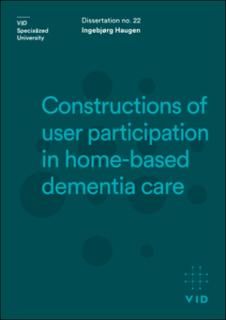| dc.description.abstract | In this dissertation I explore the topic of user participation for people with dementia living at home. The reason for the choice of topic is the increased political focus on user participation in dementia care, while there is still scarce research on the topic in this context. My research can be seen as a contribution both to research on user participation and to research on home-based dementia care. The thesis was submitted to the PhD program Diakonia, Values and Professional Practice at VID Specialized University. The dissertation consists of this synopsis and three individual academic papers.
The overall aim in the dissertation was to explore user participation in home-based dementia care. This was operationalized in three research questions:
- How is user participation understood in home-based dementia care?
- How is user participation practiced in home-based dementia care?
- What degrees of user participation qualifies as ‘real’ user participation in home-based dementia care?
The design of this dissertation is exploratory, descriptive, and interpretative. This is justified by the importance of describing phenomena or contexts in which there is little research. The dissertation was designed as a ‘best case’ study. This meant that we collected data in two municipalities which we assumed would be good in dementia care based on given criteria. The idea behind this is that if we manage to describe what the good municipalities are struggling with in terms of user participation for people with dementia, we can assume that municipalities with less resources and/or expertise will experience many of the same problems. The findings may thus have transfer value even if they cannot be generalized.
The research questions have been explored from four perspectives: 1. Research literature (presented in paper 1), 2. People with dementia living at home (presented in paper 2), 3. Family caregivers (presented in paper 2), 4. Professional caregivers in home-based dementia care (presented in paper 3).
Paper 1 is a literature review of factors affecting user participation in home-based dementia care. The search done for the literature review was broad in order to include multiple aspects of user participation. The review shows that user participation is poorly defined and describes how there is currently scarce research on user participation in relation to home-based dementia care. However, despite a lack of an agreed-upon definition of the concept, user participation is mostly understood as participation in decision-making. The paper discusses five different characteristics that affect how user participation is enabled for people with dementia living at home. These are: individual characteristics, professional caregiver characteristics, decisional characteristics, relational characteristics and organisational characteristics.
Paper 2 presents data from interviews with seven people with dementia living at home. The paper describes user participation in two different contexts: in their own home and at the day care centre. The findings show that the seven people with dementia related differently to participation in decision-making. While some preferred that others made decisions for them, others emphasised that it was very important for them to have control in their own lives by deciding for themselves. In the discussion, these findings are viewed in relation to context and relationship. I argue that people with dementia adapt to the context they are in by taking into account the needs of others, and show how relationships with different degrees of trust can lead to different needs for control and self-determination.
Paper 3 presents data from interviews with 12 professional caregivers in homebased dementia care. The paper describes and discusses five different barriers; patients are too ill, user participation collides with beneficence and nonmaleficence, lack of background information, conflicting interests between patients and family caregivers, and organization of services. The findings are discussed in relation to current policy reforms, ways of organizing home care and the felt dichotomization between user participation and care.
In this synopsis, social constructionism is introduced as an analytical tool in an attempt to combine the findings of the three individual papers into a more theoretically based discussion of user participation in home-based dementia care. In the discussion, I describe how user participation is constructed in home-based dementia care by the different informants in my study. I show that professional caregivers’ ideals of user participation do not match what they think are the needs of their patients, and I show how these constructions reflect the dominant discourse of user participation in dementia care. I also show that there are different practices of user participation, with different emphasis on the principle of autonomy. The ideals of user participation of the professional caregivers, the persons with dementia and the family caregivers are contrasted with models and ideological explanations of user participation, and discussed in light of different concepts from social constructionism.
Paper I: Haugen, I., Slettebø, T., and Ytrehus, S. (2019). Factors affecting user participation for elderly people with dementia living at home: a critical interpretive synthesis of the literature. European Journal of Social Work, 22(6), 974-986. DOI: 10.1080/13691457.2018.1441133 Not in the file in Brage because of copyright restrictions.
Paper II: Haugen, I., Ytrehus, S., and Slettebø, T. (2019). User participation among people with dementia living at home. Nordic Social Work Research, 9(2), 147-159. DOI: 10.1080/2156857x.2018.1494035 Not in the file in Brage because of copyright restrictions.
Paper III: Haugen, I., Ytrehus, S., and Slettebø, T. (2019). Barriers to user participation in home-based dementia care: experiences of professional caregivers. Nordic Social Work Research, DOI: 10.1080/2156857x.2019.1679661 Not in the file in Brage because of copyright restrictions. | en_US |
